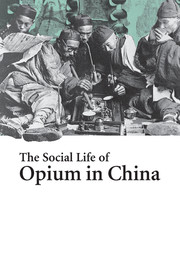Book contents
- Frontmatter
- Contents
- List of illustrations
- List of maps
- List of tables
- Acknowledgements
- Introduction
- 1 ‘The art of alchemists, sex and court ladies’
- 2 As the empire changed hands
- 3 ‘The age of calicoes and tea and opium’
- 4 ‘A hobby among the high and the low in officialdom’
- 5 Taste-making and trendsetting
- 6 The political redefinition of opium consumption
- 7 Outward and downward ‘liquidation’
- 8 ‘The volume of smoke and powder’
- 9 ‘The unofficial history of the poppy’
- 10 Opiate of the people
- 11 The road to St Louis
- 12 ‘Shanghai vice’
- Conclusion
- Notes
- Glossary
- Bibliography
- Index
2 - As the empire changed hands
Published online by Cambridge University Press: 05 June 2012
- Frontmatter
- Contents
- List of illustrations
- List of maps
- List of tables
- Acknowledgements
- Introduction
- 1 ‘The art of alchemists, sex and court ladies’
- 2 As the empire changed hands
- 3 ‘The age of calicoes and tea and opium’
- 4 ‘A hobby among the high and the low in officialdom’
- 5 Taste-making and trendsetting
- 6 The political redefinition of opium consumption
- 7 Outward and downward ‘liquidation’
- 8 ‘The volume of smoke and powder’
- 9 ‘The unofficial history of the poppy’
- 10 Opiate of the people
- 11 The road to St Louis
- 12 ‘Shanghai vice’
- Conclusion
- Notes
- Glossary
- Bibliography
- Index
Summary
Timothy Brook writes in the Cambridge History of China that ‘the experience of life in China changed remarkably over three centuries of Ming rule’. One of the changes was tobacco smoking. I devote this chapter to tobacco smoking, snuff bottles and to the four cultures of consumption in the seventeenth century, in order to illustrate the type of soil from which opium was to grow. We cannot understand opium without contextualising it within the larger context of its sister cultures: tobacco and snuff bottles, and the consumer cultures of cuisine, herbs, utensils and tea. These cultures of consumption blossomed during the Ming and Qing, as peace and prosperity allowed time and space for the redefinition of life and culture, both high and low. By the seventeenth century Chinese people had turned the tradition of cuisine into a philosophy, the practice of herbs into a science, the use of utensils into an art and the consumption of tea into a religion. Although opium the aphrodisiac was a knowledge that was limited to the learned in the seventeenth century, tobacco smoking was universally popular. Introduced a century earlier, the practice had become a Chinese consumer culture. China had always been a melting pot and Chinese culture a constellation of identities. Foreign commodities and ways of recreation, such as tobacco smoking, had enriched the economy, culture and society. The commerce, consumption and culture of tobacco highlight the significance of the Ming's maritime trade, economic growth and consumer culture.
- Type
- Chapter
- Information
- The Social Life of Opium in China , pp. 25 - 40Publisher: Cambridge University PressPrint publication year: 2005



